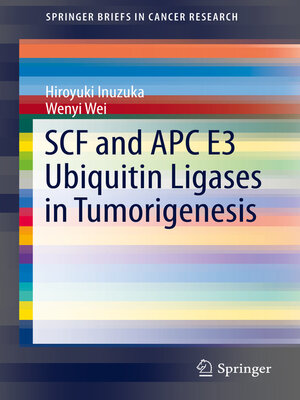SCF and APC E3 Ubiquitin Ligases in Tumorigenesis
ebook ∣ SpringerBriefs in Cancer Research
By Hiroyuki Inuzuka

Sign up to save your library
With an OverDrive account, you can save your favorite libraries for at-a-glance information about availability. Find out more about OverDrive accounts.
Find this title in Libby, the library reading app by OverDrive.



Search for a digital library with this title
Title found at these libraries:
| Library Name | Distance |
|---|---|
| Loading... |
This SpringerBrief explores the physiological roles of Skp1-Cullin1-F-box Complex (SCF) and Anaphase Promoting Complex (APC) in normal cells and in tumor formation. These two related, multi-subunit E3 ubiquitin ligase enzymes, APC and SCF are thought to be the major driving forces governing proper cell cycle progression. Defective cell cycle regulation leads to genomic instability and ultimately, cancer development. Selective degradation of key cell cycle regulators by the ubiquitin-proteasome system has been proven to be a major regulatory mechanism for ensuring ordered and coordinated cell cycle progression. The SCF and APC E3 ligases have been characterized to play pivotal roles in regulating the cell cycle progression by timely degrading various critical cell cycle regulators. This Brief reviews recent studies that have shown that deregulation of signaling pathways in which the two ubiquitin ligases are involved causes aberrant cell cycle regulation, in turn leading to tumorigenesis. The text also discusses how SCF and APC may present promising therapeutic targets to treat various cancers.







